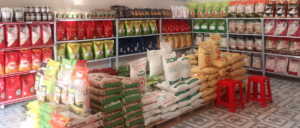Do Rice Trading Facilities Need a Certificate of Food Safety Eligibility?
In the context of increasing regulations aimed at ensuring food safety, many businesses are questioning whether they need a Certificate of Food Safety Eligibility. This article addresses that question and provides information based on current legal regulations.

1. Regulations on the Food Safety Certificate
According to Article 12 of Decree 15/2018/ND-CP, food production and trading facilities must have a Certificate of Food Safety Eligibility, except for certain exemptions, including:
- Small-scale primary production;
- Small-scale food trading;
- Trading pre-packaged food;
- Producing and trading tools and materials for food packaging and containment;
- Facilities already certified under international food safety standards (GMP, HACCP, ISO 22000, etc.).
2. Are Rice Trading Facilities Exempt or Required?
Rice is considered pre-packaged food or small-scale traded food in many cases. According to the regulations, if a rice trading facility falls under one of the following categories, it is NOT required to have a Certificate of Food Safety Eligibility:
- Small-scale food trading: For instance, selling at markets or small stalls without large-scale business registration.
- Trading pre-packaged rice: Rice that has been packaged and supplied by certified manufacturers.
However, if the rice trading facility does not fall under the above exemptions (e.g., large-scale trading or unpackaged rice), obtaining a Certificate of Food Safety Eligibility is mandatory.
3. Benefits of Complying with Food Safety Regulations
Complying with food safety regulations not only helps businesses avoid penalties but also:
- Enhances credibility with customers;
- Ensures product quality;
- Facilitates participation in international markets.
Additionally, in the industrial meal and catering sectors, adhering to these regulations is even more critical to ensure food safety for daily meals, from factories and schools to hospitals.
4. Reference Official Sources
The information in this article is based on the provisions of Decree 15/2018/ND-CP and an article from Thư viện Pháp Luật.
Contact us for detailed advice on food safety regulations!


 VN
VN